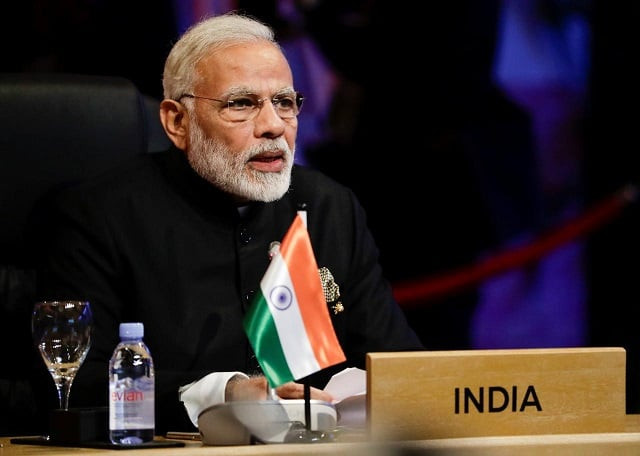Indians prefers military rule, suggests study
Support for autocratic rule is higher in India than any other nation in Pew survey

India's Prime Minister Narendra Modi participates in the opening session of the 15th ASEAN-India Summit at the Philippine International Convention Center in Manila, Philippines, November 14, 2017
PHOTO: REUTERS
At least 53 per cent of Indians support military, Pew Research Center survey reveals. The results, released last week, shows that out of Vietnam, Indonesia, South Africa and India, the latter is the only one who showed tremendous support for a military government.
As many as 55 per cent of Indians also back a governing system “in which a strong leader can make decisions without interference from parliament or courts,” the survey said. Support for autocratic rule is higher in India than any other nation in the survey. Since the first election in 1952, India has become a “multiparty government” with a parliamentary system and a “commitment to free elections”.
China banks on regional support amid ‘Indian threats’ to CPEC
However, like many democracies in the world, India’s citizens are increasingly showing preference towards a leader with authoritarian style of leadership. Supporters of Modi's ruling Bharatiya Janata Party (BJP) and urban dwellers "are significantly more likely" to support military rule than backers of the opposition Congress party and rural residents, the Pew Research Center survey showed.
Perhaps it is the high level of corruption in India that has encouraged tough measures such as demonetisation; the public is now hoping for “a stronger hand on hot-button issues” such as economic inequality, explained Tony Nash, founder and CEO of data analytics firm Complete Intelligence.
The survey's results weren't surprising, Nash said. "Now that we're deeper into the nationalistic wave that started with leaders such as Japanese Prime Minister Shinzo Abe, people are seeing that centralized decisions make progress so they're not opposed to something more dramatic."
Modi's critics often accuse his government of autocratic rule. West Bengal Chief Minister Mamata Banerjee, who is the founder of the All India Trinamool Congress political party, alleged last month that the BJP was hurting media freedom by harassing news agencies critical of New Delhi. Another common complaint directed at the BJP is its use of central agencies to interfere in provincial governments.
'For all the chest-thumping, India can't win a war against Pakistan'
"In the embrace of strong leaders who promise both economic growth and stability, Asia risks a return to authoritarian rule if institutional checks and balances are not also in place," said Curtis Chin, former US ambassador to the Asian Development Bank and Asia fellow at the Milken Institute.
"There is no question that these are troubling times for democracy in Asia, but long-suffering citizens want results not rhetoric. The latest Pew data may well underscore that," he said.


















COMMENTS
Comments are moderated and generally will be posted if they are on-topic and not abusive.
For more information, please see our Comments FAQ